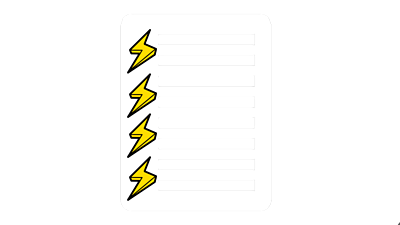
Scriptwriting Glossary
The world of scriptwriting is full of terms and phrases which may be confusing. Below is a list of definitions that we hope will help writers on the way to grasping what they all mean, including links to other articles and resources to support you further.
If you would like any other terms included, please contact us.
3 Act Structure
Put in the simplest way, a beginning, middle and end. Do something significant in the beginning – or the opening ‘act’ – of your script. Make things difficult for the characters while keeping up the momentum of the story for the audience in Act 2. Satisfy the audience with your ending in Act 3 but this doesn’t mean you need to give them a happy outcome. Make the ending fit and have impact.

Beat Sheet
A simple document listing the key events (or beats) of a story. It acts as the bare bones with no dialogue or character descriptions and supports the writer in mapping their script ahead of writing it.

Bible
There are a couple of versions of a BIBLE.
-
A detailed internal document often used by production companies and SHOWRUNNERS for continuity purposes when introducing new writers on a show for returning TV series.
-
A long selling document which producers and TV execs will request before reading the script (Also known as a Show Bible, Selling Bible). This will be heavily detailed piece of work explaining the Story, Tone & Style, Characters and potential for franchise if it's a TV series. Similar but sometimes more text based than a PITCH DECK.

Comedy Drama
Scripts which contain both humour and pathos in a complementary way. Strong comedy dramas show the light and dark sides of life.

Deadline
A time or day by which something must be done. For professional screenwriters, deadlines are an huge part of the job but for less experienced writers, setting deadlines can be a valuable tool to create discipline and drive the creative writing process forward.

Development
The process from pitch to script to screen. In scriptwriting, this is often a long, complex process which can last years. If an idea or script gets taken into development, it doesn't guarantee that it will get produced.
At Βι¶ΉΤΌΕΔ Writers we do not commission or produce projects, rather we seek out the most exciting and promising new voices who could be the original series creators of the future, and we support them to develop their writing craft skills, industry knowledge and contacts via a series of targeted programmes of professional development.

Draft
An early or rewritten version of a piece of writing. No script falls perfectly finished onto the page after an intensive bout of extreme creativity. Scriptwriting is rewriting – whether it’s on the page or in your head, over days, weeks, months or years. To write and rewrite, you need to give your story time and space.
Once you enter a relationship with a Production Company, the DEVELOPMENT stage will involve more rewriting and drafts. Writers will need to learn to take NOTES and collaborate effectively on their work.

Drama
Drama literally means 'action' - to act. There is commonly little to no emphasis on humour in a standard drama. The progressive nature of many dramas allows for a greater sense of character growth and development, even across multiple series.

Exposition
Information the audience needs to know to understand the Story and Character. However, writers should be cautious of being over expositional, particularly in the dialogue and they should adopt a SHOW DON’T TELL approach.

General Meeting
An invitation offered by a member of a Production Company (script editor / producer) who has read and enjoyed a writer’s work. Often like a first date, this is an opportunity for both parties to get to know one another and decide whether they could develop a working relationship. Writers should come to this having done research on whoever they are going to meet – what stories and areas that particular production company is interested in for example – and be prepared to discuss further writing ideas. This is perhaps where a few PITCHES could be useful.

Genre
The way your script is categorised based on its distinctive characteristics such as Setting, Characters, Plot and Themes. Examples of common genres are Thrillers, Sci-Fi and Romance. When writing, you should bring a fresh perspective to well trodden areas. Clashing genres can work if they’re handled well such as Comedy Horror. If you are going to go for a genre twist, then ask yourself the question: ‘why am I doing it?’ Don’t write in a genre you don’t care about just to make your writing stand out.

Green Light
When a script or project has been given the go ahead to move from the development stage to production. However, projects can still fall through even after receiving a green light.

Inciting Incident
This is the event which makes the protagonist want something and sets them on their journey. This should be used to hook the reader/viewer early in the script, certainly within the first 10 pages.

Indie
Short for Independent Production Company. Broadcasters like the Βι¶ΉΤΌΕΔ will only consider ideas from individuals attached to a production company. So if you are hoping to have your project commissioned, you may wish to consider researching and contacting independent production companies to pitch your idea in the first instance.

Logline
A one (sometimes two) sentence summary of your script or TV series. It captures all the key ingredients of your concept: Protagonist, INCITING INCIDENT, Antagonist, WORLD, Stakes.

Medium
The form in which a writer chooses to present their story such as Theatre, Radio, Television or Film. The decision is an important one and a script written in the wrong medium can have a negative effect. The way a script is formatted is usually determined by the type of script you are writing.

Need
What a character subconsciously pursues in the script. This is an abstract goal such as love or courage and is found late on in a story. Often at odds with the WANT.

Notes
Comments and suggestions made on your script from another person to develop it. Notes can come at any stage of the writing process and from a range of people. It's recommended for emerging writers to share their work with trusted friends and contacts to receive feedback and work on further DRAFTS before sending the work on.
Professional scriptwriters receive notes by people in the industry such as an Script Editors, Development Producers and Production Company Executives. Writers don't necessarily have to take every note given to them but they must take on a collaborative attitude and be prepared to make changes to their work.

Option
An option is when you sign a contract giving the rights over a script to a production company for a set period of time. This means any other work you do on it (or the supporting documents eg treatment, outline etc) will be paid. Again, this is where it is useful if you have an agent as they will negotiate terms on your behalf.

Overview
A short introductory paragraph which has more expanded detail on the LOGLINE. This could include why you want to tell this story, why now and why it will speak to audiences. Often found in the SERIES OUTLINE.

Pitch
A short and punchy document, usually 1-2 pages long which sets out the key central ideas and themes, WORLD, characters and tone. Essentially a sales document to share with Producers and potential collaborators.

Scene by Scene
A document often asked for in the DEVELOPMENT process where writers create a breakdown of their story through a list of scenes before moving on to writing a script. More detailed than a BEAT SHEET, this lists and details the action within each one. Scenes in which things are just explained or related are not scenes – they are EXPOSITION, because nothing really happens. Something significant must happen in each one to drive the story forward.

Script Reader
Someone employed by companies within the theatre, film and television industry on a freelance basis to read script submissions. They are required to have great editorial judgment and the ability to discern writing talent and potential. Often the job of reader comes at the start of a career in the editorial side of Drama development and production. Many producers, writers and script editors began their careers as script readers.

Series Outline
Similar to the TREATMENT but more used with collaborators or in the writer’s own development towards writing the first draft of the script. Often includes a thorough breakdown of a concept, the structure of an episode and characters.

Show Don't Tell
Allowing your Characters to express themselves through visuals and actions instead of over explaining thoughts and emotions through dialogue with EXPOSITION.

Showrunner
Someone who has creative control across the production of a TV series. Also known as Head Writer. Will work closely with Producers and oversee a writing team.

Spec Script
Spec is short for speculative. This is something that you've not been asked to write and usually you're not being paid to write. It’s an idea of your own and should be a calling card that showcases your talent, your ability and your voice to be shared with PRODUCTION COMPANIES and script opportunities.

Story
This is character-led and is the Who, What and Where. The basic story should be within the LOGLINE.

Treatment
A longer document (usually 6-8 pages) which will incorporate some of the work done in the PITCH. This includes greater detail around the pilot episode, key story beats, world, characters and conflict as well as suggestions of what might happen in subsequent episodes. This is a selling document to get people excited about your idea.

Voice
A script with a strong voice is written in a way that no one else could have written in the way you have. It contains the kind of qualities that express who you are as a writer, it demonstrates your passions and strengths, and feels uniquely you. This is widely looked for in scripts by people working in the industry.

Want
What a character consciously pursues in the script, often a concrete goal such as a prize or money. Often at odds with the NEED.

World
Where you set your story and the particular area or characters within your script. The world could just be a setting or a precinct. It doesn't necessarily need to be huge in terms of scale.

Writers' Room
A room of writers – sometimes of different levels of experience - who collaborate and devise ideas for stories and episodes on a TV production. More widely used in America but they are becoming more common in the UK Industry.
